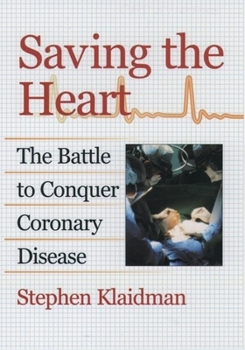Saving the Heart: The Battle to Conquer Coronary Disease
Though still the leading cause of death, coronary heart disease is now killing half as many people in the U.S. as in the 1960s, partly because of innovative treatments like bypass surgery, balloon angioplasty, and thrombolytic drugs. This book tells the stories of the bold researchers who developed such treatments and explores the tough ethical questions raised by the big money being made in modern cardiology.
Klaidman shows how clinicians, engineers, and entrepreneurs have devised radically new ways to treat a diseased heart. He examines the startling extent to which financial ambition has shaped the dynamics of cardiology--now a multi-billion dollar medical/academic/industrial/governmental hybrid--and the inevitable conflicts of interest such ambition creates. Can a patient's needs come first when market share and profits skew the focus away from medical prudence? Can clinical trials be both free of bias and fast enough to keep up with the flood of new drugs and high-tech devices? Klaidman tackles these questions using real cases, often in the context of wrenching bedside decisions.
Immensely readable and packed with vivid detail, Saving the Heart explores the past, present and swiftly developing future of a high-stakes medical specialty. And it weaves into the fast moving narrative advice on how to make the right treatment choices and identify the best cardiologists and surgeons. If you are one of the 14 million Americans who suffers from coronary disease, Saving the Heart could save your life.
Klaidman shows how clinicians, engineers, and entrepreneurs have devised radically new ways to treat a diseased heart. He examines the startling extent to which financial ambition has shaped the dynamics of cardiology--now a multi-billion dollar medical/academic/industrial/governmental hybrid--and the inevitable conflicts of interest such ambition creates. Can a patient's needs come first when market share and profits skew the focus away from medical prudence? Can clinical trials be both free of bias and fast enough to keep up with the flood of new drugs and high-tech devices? Klaidman tackles these questions using real cases, often in the context of wrenching bedside decisions.
Immensely readable and packed with vivid detail, Saving the Heart explores the past, present and swiftly developing future of a high-stakes medical specialty. And it weaves into the fast moving narrative advice on how to make the right treatment choices and identify the best cardiologists and surgeons. If you are one of the 14 million Americans who suffers from coronary disease, Saving the Heart could save your life.
Format:Hardcover
Language:English
ISBN:0195112792
ISBN13:9780195112795
Release Date:January 2000
Publisher:Oxford University Press, USA
Length:288 Pages
Weight:1.25 lbs.
Dimensions:1.0" x 6.4" x 9.6"
Customer Reviews
1 rating
HEARTily recommended
Published by Thriftbooks.com User , 24 years ago
Stephen Klaidman has provided us with a very interesting, easy reading book that I recommend to anyone who has a heart condition or is interested in the subject. The major portion of the book discloses chronologically how heart conditions were treated from its earliest practitioners to the present day. Biographical sketches of medical developers, practitioners, entrepreneurs, etc. provide human interest to the emerging history.All major surgical developments, most of which occurred in the twentieth century, are explained in detail. The struggles of medical pioneers to gain acceptance of what at the time were radical innovations are amply explored. Among these innovations are angiography (imaging technology), heart-lung machine, coronary bypass surgery (with and without the heart-lung machine), angioplasty, and minimally invasive bypass surgery.Hi-tech heart surgery-an extremely complex and difficult subject-is explained for the layman to understand. The benefits and problems of each of the current procedures are explained.Klaidman explores hi-tech surgical instruments, a highly profitable multi-billion dollar business. His biographical profiles of some developers (doctor-engineer-inventors) and entrepreneurs disclose how the competitive race of developers to market first and the rivalry of entrepreneurs for market share may be detrimental to the best interests of patients.None of the many present sophisticated treatments provide a cure! They just alleviate symptoms. The pioneers of today are searching for cures. Their approaches are described and are not only fascinating but also innovative. The final chapter discusses the ethical questions raised by our current medical system: conflicts of interest between practitioners with financial stakes in various treatments; competition between advocates of various treatment options; competition between various surgical equipment manufacturers for market share; the pressure to reduce costs by HMOs; etc.If there is one fault to the book, it is that the title "Saving the Heart: The Battle to Conquer Coronary Disease" led me to believe that it would be more comprehensive. The drugs-nitroglycerin, Coumadin, beta-blockers, calcium channel blockers, statins--were mentioned only as they pertained to a topic then being explored, not in the detail the surgical treatments were given. Not even mentioned are life style changes--diet, exercise and meditation--that Dean Ornish has proposed. A book on these topics written as well as this one would definitely be welcomed.But for what this book does it does it so well a five star rating is most appropriate.





